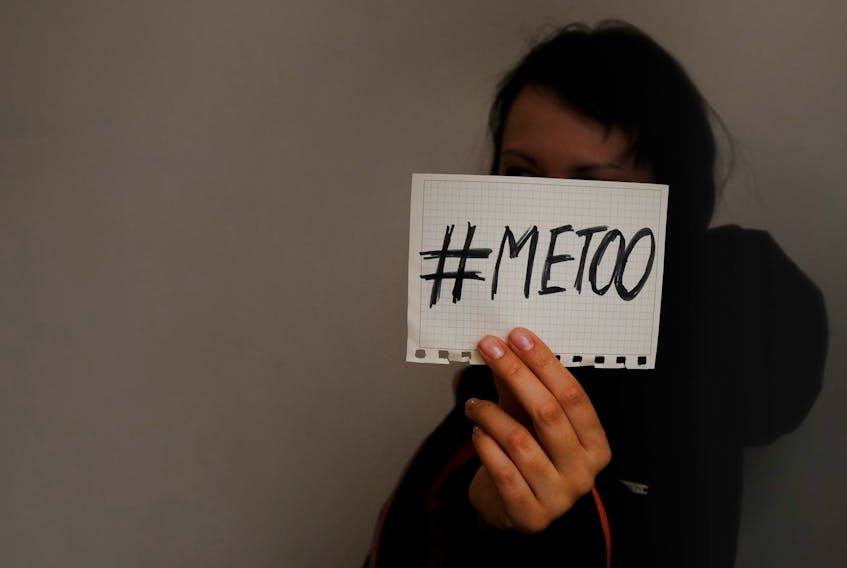Emma A. sees herself not only as a survivor of rape, but a survivor of a system that did nothing to help her during a time of trauma.
She was sexually assaulted by a man she dated for over a year, but had broken up with. And although this deeply affected her emotionally and physically, Emma says it was her dealings with police that made her decide to leave Prince Edward Island.
(Note: The Guardian has changed the names of all the female victims quoted in this story, to protect their identity as victims of sexual assault).
It all began after her breakup in late 2010. Emma’s ex-boyfriend was not happy. He showed up on the street where she lived, harassing her friends for her whereabouts, constantly trying to get back together. His persistence wore her down, finally getting her to agree to meet with him at the home of a mutual friend. They were alone.
“We were talking and he kept trying to make a move and I just kept pushing him away,” she remembers.
“I was not a very confident person back then in saying no. So I kept pushing him away and he just kept trying … eventually I just kind of shut down.”
She rationalized that she had agreed to everything. But her body rejected this, as she began to experience physical symptoms of extreme anxiety – bouts of “shakes” and paranoia.
She went to the Charlottetown police to report that she had been raped. But over a month had passed since the assault, and Emma says police were “immediately skeptical.”
She was questioned and her text messages were downloaded. She was told she’d be updated on the case. But then – radio silence. Emma called the police station weekly, looking for updates, to no avail.
Finally, she was called in and told police would not pursue charges. Her assaulter had claimed the sex was consensual, so it was essentially a he-said-she-said case.
“They said, ‘Who’s to say it wasn’t consensual because you dated before and had sex in similar situations when you were dating,’” Emma remembers the officer telling her at the time.
“And that the worst part for me. I felt like they didn’t take me seriously.”
Ten days later, she emptied her apartment in Charlottetown and left P.E.I. with just two suitcases of clothes to her name.
“I had been very stressed and anxious before I reported, but as soon as that came out of the cop’s mouth, I was like, ‘I’m moving. I can’t stay here. I don’t trust the police.’”
She believes hers is one of the cases of sexual assault deemed by police to be “unfounded.”
But she can’t know for sure, because when she tried to file a freedom of information request to learn more about her case following the Globe and Mail’s series of investigative stories on unfounded sex assault cases last year, Emma learned that Charlottetown Police Services is not covered under access to information law.
Emma is one of a number of women who responded to a request by The Guardian to speak with Islanders whose cases or allegations of rape or sexual assault were dropped or deemed unfounded by police in P.E.I.
Another woman who came forward was Ashley M., whose case was also eventually dropped by Charlottetown police.
She was 22 when she experienced two incidents of assault involving a young man who was a friend of her roommates.
The first time, she decided not to tell anyone right away, not wanting to cause a rift in her friend group.
But one night, Ashley fell asleep on a friend’s couch after she’d been drinking. She woke up in the night to realize the back of her tights had been ripped open and the young man was thrusting into her backside.
This time, Ashley went to police. They made her repeat her story over and over. They asked questions like, “Did you flirt with him?” and “How much did you have to drink?”
The officer later confronted her when her aggressor told the cops she had kissed him on a separate, unrelated occasion. This implied there was a relationship, the cop told her.
“He was like, ‘I need you to be really truthful with me, because accusations like this can really hurt people,’” Ashley recalled.
“He started explaining about how this could ruin his job, his family life, his social life. Trying to make me feel bad, basically.”
The officer told Ashley and the man to avoid one another, but no charges were laid. The case again boiled down to he-said, she-said.
“It’s always going to be his word against hers. How do you ever get any sort of help after these things happen to you?” Ashley said.
Not only did it cause her emotional anguish, knowing her assaulter would walk away with no consequences, but many of her friends assumed she had made the whole thing up after police did not pursue charges.
“Because the police did not do anything at all, I got hurt even more,” she said.
“It still to this day upsets me that nothing was done because I know that I’m not the only one.”
The Guardian requested an interview with Charlottetown Police Services to address these cases and also to explain how it deals with cases of sexual assault it has classified as unfounded. No one was made available for an interview.

In a written statement, Deputy Chief Brad MacConnell said he could not speak to individual cases. He suggested sending victims with complaints to Victim Services or to file a formal complaint.
As for how the force deals with “unfounded” cases, MacConnell acknowledged the use of this classification for cases has “lacked a clear definition of what should have been labelled ‘unfounded’ which led to various interpretations from police services.”
“Unfounded is a status for a records management system and in no way is meant to suggest that matters were not investigated or that complainants were not believed,” he said in the statement.
“Charlottetown Police Services takes all sexual assault allegations seriously and encourages anyone who is a victim to come forward and report it to police.”
The Police Information and Statistics Committee (POLIS) and the Canadian Centre for Justice Statistics (CCJS) are in the process of updating their policies pertaining to the scoring on unfounded criminal incidents and Charlottetown Police Services will be adhering to these modifications, MacConnell added.
“Training for these new scoring changes has begun and will be mandatory for all officers and records management personnel.”
In early 2017, the government of Prince Edward Island asked all police agencies in P.E.I. to conduct a review of any sexual assault cases that had been classified as unfounded over the previous three years.
The review found that close to 40 per cent of sexual assault cases reported to police agencies were deemed unfounded in P.E.I. The national rate, according to data compiled by the Globe and Mail, was 19 per cent.
This review noted that “a significant factor has been an unclear definition of the term ‘unfounded’ in statistical reporting across police agencies and across jurisdictions,” according to a briefing note tabled in the P.E.I. legislature in December 2017.
Following the review, Charlottetown Police Services determined that all 107 of its cases of reported sexual assaults between 2014-2016 were scored accurately. Half of those cases remained classified as unfounded after the review.
The RCMP, meanwhile, went back six years in its review. It rescored 31 filed as “unsolved-unsubstantiated” and related classifications. But a total of 199 of the 428 cases of sexual assault reported to RCMP in P.E.I. remained “unfounded” after the review, or 46 per cent of cases.
Women who spoke with The Guardian shared what it feels like to be one of those statistics.
Jessica G. says she screamed at the top of her lungs when she got the voicemail from RCMP saying they would not be moving forward with her case.
Her assault happened in May 2017 when she and a group of friends gathered at a cabin in P.E.I. to celebrate her best friend’s 19th birthday.
After passing out in a car, she woke up, naked, with a young man from the party about to penetrate her.
“I asked why I was naked. He asked what I meant. I asked why he was naked. His phone rang, and it was my best friend. She screamed at him, telling him to get back to the cabin,” Jessica recalls.
“He told me to put my clothes back on. I found them thrown across the floor of his back car seat.”
When they got back, her friend was already on the phone with the RCMP. They came and took statements from her and her friends.
But the next day, they confronted Jessica with a text message she had sent her assaulter that night that was sexually explicit. Jessica doesn’t remember sending it, but says it shouldn’t matter.
“I can’t consent if I’m passed out,” she said.
Several weeks passed with no further contact from police, although she says she was referred to counselling services. Then one day, she simply got a voicemail from and RCMP officer, telling her they would not be laying any charges.
“I screamed in the parking lot of my work. I was a mess,” she said.
“I was so belligerently angry.”
Linda C. echoed those sentiments of feeling angry and frustrated at the lack of action from the RCMP in her case.
The mother of grown children says she met her aggressor on the dating website Plenty of Fish and the two had a few dates before he made his move.
Directing her to drive to the end of a quiet dirt road, the large man overtook her and raped her in her vehicle. She did not go to police right away, blaming herself for the incident, as many victims do.
But when she saw the man’s photo in the news in connection with a sexual assault case, she immediately contacted RCMP. He had given her a fake name, so she had no idea he had a previous conviction for sexual assault and was up on charges for another assault.
She had trouble remembering details of her rape and had no physical proof to give to police.
Eventually they told her they did not have enough evidence to lay a charge. Linda says she felt minimized by the officers who interviewed her.
“I felt like I wasn’t even heard,” she said, breaking down into tears.
“I didn’t feel like I was validated.”
No one from the P.E.I. RCMP was available for an interview.

In a statement to The Guardian, Sgt. Kevin Baillie said the RCMP has undertaken enhanced training to strengthen police awareness, victim support and investigative accountability as a commitment towards continually improving how employees respond to complaints of sexual assault.
He encouraged any victims with concerns to file a complaint with the Civilian Review and Complaints Commission.
“The RCMP, along with the municipal police agencies of the Island, want individuals to know that they are supported and encourage them to report all assaults to police in their jurisdiction,” Baillie said in the statement.
“Sexual assault has a devastating impact on victims. Investigations can be challenging and complex in determining the specific circumstances of an assault allegation, and in identifying and preserving evidence. As stated by the RCMP Commissioner at the time the review was being conducted, the result of an investigation must turn on evidence, and not on opinion.”
But not everyone’s concerns involve their treatment by police.
Chantal L. told The Guardian she felt the police officers she dealt with were very professional and compassionate after she was raped in her home in early 2016 by a stranger, who was responding to an ad she had placed for a professional service.
It was staff at the Queen Elizabeth Hospital when she went for a rape kit that she says were cold and compassionless.
When she presented at the hospital, she says the triage nurse on duty demanded details when she reported that she was raped.
Then when she was finally let in, they took her clothes away for the rape kit and were unconcerned about the fact they had nothing that fit her for her to wear home.
Finally, when the doctor came to gather samples, she says she was not informed of what the procedures were and did not feel comfortable with a male doctor. In the end, she felt so triggered, she completely “disassociated,” which made her feel re-traumatized.
“It was almost worse (than the attack),” she said.
“When you were just attacked, you lost power. And if the rape kit had been done, maybe in a way I would know what would happen... then I can take my power back,” she said.
Chantal says if she had known what the experience of going for a rape kit would be, she would never have done it.
“For me, that’s where the problem is.”
She did not move forward with charges and decided instead to leave the Island.
No one from Health P.E.I. was made available for an interview.
In a written statement, Mike MacDonald, nurse manager for the QEH emergency department, said nursing staff try to be as supportive as they can to victims of sexual assault, and emergency departments have been following a training program for nurses so they are educated on how best to support victims both clinically and emotionally.

Additionally, QEH and PCH do have a few SANE (sexual assault nurse examiner) nurses on staff.
“We appreciate and respect that a sexual assault is a very traumatic experience, and that it can be very difficult for an individual to reach out for help and seek care. As health-care providers and as people, we want to provide them with the support and compassion they need when they do seek our help. Should an individual ever feel that we have been anything less than supportive, we want to know so that we can follow up and address their concerns.”
Meanwhile, other women told The Guardian their biggest concern is with how the justice system deals with sex criminals if their cases ever do make it to court.
Erin M., whose step-father was convicted of sexually abusing her as a child, described the sentences given for sex crimes as “pathetic.”
“Once it got to court, my step-father pled guilty and got a slap on the wrist. Since he is an alcoholic he blamed his behaviour on that, saying he was not in control of himself,” she said.
“I think the judicial system let me down, and I see it happening over and over, very little jail time; house arrest.”
Michelle N. echoed these concerns.
“My sexual assault story is from when I was a little girl, but I think the most discouraging part of going to the police is that they only gave him four months behind bars,” she said.
“No matter if it's a child or a woman, I believe anyone who sexually assaults anyone should be dealt with better than that.”
Dawn M. told The Guardian she did not see the point of ever reporting her experience of sexual assault to police, because becoming another ‘unfounded’ statistic would be devastating.
“I will never go to the police to report what happened almost 10 years ago,” she said.
“The amount of shame I would feel, on top of how much shame I have already, if nothing happened would cripple me.”
At a glance
What to do:
- Anyone who has been attacked should call 911 right away or go to the nearest hospital and request a rape kit.
- Victims can also make an appointment with their family doctor to go over options.
- To request counselling services from the P.E.I. Rape and Sexual Assault Centre, call 902-368-8055 or toll-free 1-888-368-8055.
- The Island Helpline provides free, confidential emotional support and crisis intervention to Islanders at 1-800-218-2885.
Twitter.com/GuardianTeresa









